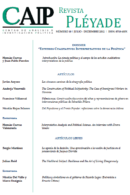
Publicado 2012-12-30
Palavras-chave
- security,
- resilience,
- liberalism,
- danger,
- subjectivity
- biopolitics ...Mais
Como Citar

Este trabalho está licenciado sob uma licença Creative Commons Attribution-NonCommercial 4.0 International License.
Resumo
While security has functioned historically as the major rationality for the subjection of populations to liberal governance, the rationality enabling that subjection is fast changing to that of resilience. This is not just a semantic shift. Resilience entails a fundamental change in conceptions of the relationship of human beings to danger. To be secure, classically conceived, means to be free from danger. The discourse of resilience functions to prevent humans from conceiving danger as a phenomenon from which they might free themselves from and, in contrast, as that which they must now expose themselves to. This is because the modelling of human subjectivity under conditions of neoliberalism reifies its biological life as the domain of agency and governance. In this sense resilience represents a significant extension of the biopolitical drivers of neoliberal modernity. Contesting the global injunction to give up on security requires a subject capable of imagining itself as something more than merely biological material. A political subject whose humanity resides in its freedom to secure itself from the dangers that it encounters. In context of which it is necessary we turn from the mere analysis of biopolitics to the theorization and practice of psychopolitics.